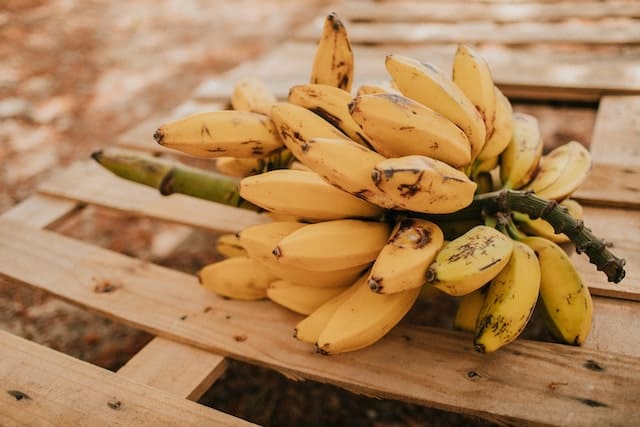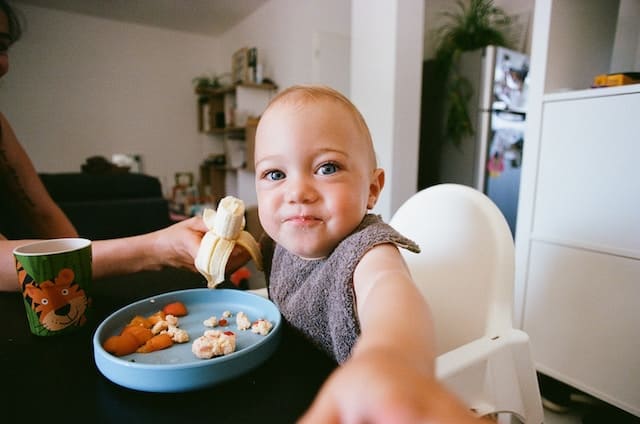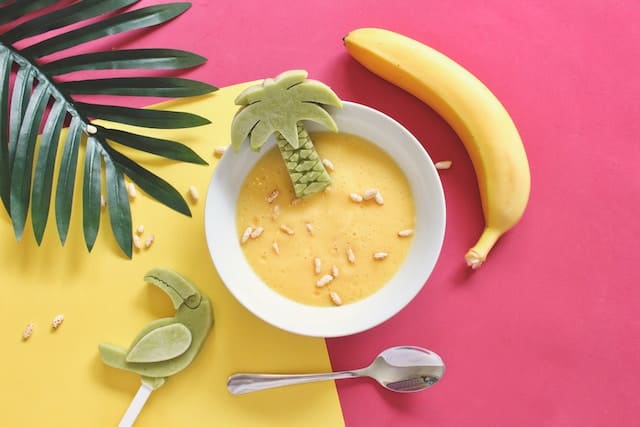Bananas are a popular fruit among babies due to their sweet taste and soft texture. They are also rich in nutrients, making them a healthy addition to a baby’s diet. But can babies eat bananas every day?
Understanding the nutritional content of bananas is important when considering how often babies can eat them. Bananas are a good source of potassium, vitamin C, and dietary fiber.
They also contain other essential vitamins and minerals. However, they are also high in natural sugars, which can contribute to tooth decay and other health issues if consumed in excess.
Key Takeaways
- Bananas are a nutritious fruit that can be a healthy addition to a baby’s diet.
- Babies can start eating bananas at around 6 months of age.
- While bananas can be eaten every day, it is important to monitor their intake to ensure they are not consuming too much natural sugar.
Understanding the Nutritional Content of Bananas
Bananas are a popular fruit for babies and adults alike, and for good reason. They are packed with essential nutrients that can help support a healthy body.
Here’s a closer look at some of the key nutritional content of bananas:
- Potassium: Bananas are a great source of potassium, an essential mineral that helps regulate blood pressure and support proper muscle and nerve function.
- Fiber: Bananas are also high in fiber, which can help promote healthy digestion and bowel movements.
- Vitamin C: This vitamin is important for immune system function and helps the body absorb iron from plant-based foods.
- Vitamin B6: Bananas are a good source of vitamin B6, which helps support brain development and function.
- Magnesium: This mineral is important for bone health and can also help regulate blood sugar levels.
- Vitamins and Minerals: Bananas contain a variety of other vitamins and minerals, including protein, iron, calcium, and folate.
Bananas are also relatively low in calories and fat, making them a great choice for a healthy snack. They are naturally sweet, which can help satisfy a sweet tooth without resorting to processed sugars.
Additionally, bananas have a low glycemic index, which means they won’t cause a rapid spike in blood sugar levels.
Overall, bananas are a great addition to a baby’s diet, providing a wealth of essential nutrients in a convenient and tasty package.
When Can Babies Start Eating Bananas?
Bananas are a great source of nutrition for babies, but when can they start eating them?
According to pediatricians, babies can start eating bananas as early as six months old when they begin to eat solid foods. Bananas are one of the first foods that parents can introduce to their babies.
Before introducing solid foods to your baby, it is important to consult with a pediatrician. The pediatrician will advise on when to start solid foods and which foods to introduce first.
Bananas are a great food to start with because they are easy to digest and are unlikely to cause an allergic reaction.
When introducing bananas to your baby, it is important to ensure that they are ripe and mashed or pureed. This will make it easier for your baby to digest and prevent choking.
It is also important to introduce one new food at a time to monitor for any allergic reactions or digestive issues.
In conclusion, babies can start eating bananas as early as six months old when they begin to eat solid foods. It is important to consult with a pediatrician before introducing solid foods and to ensure that bananas are ripe and mashed or pureed.
By following these guidelines, parents can introduce their babies to the delicious and nutritious world of bananas.
How to Serve Bananas to Babies
When introducing bananas to babies, it is important to ensure that they are ripe and soft enough to be easily mashed or pureed. Ripe bananas are also sweeter, making them more appealing to babies.
For infants who are just starting on solid foods, mashed banana is a great option. Simply peel the banana and mash it with a fork until it is smooth and free of lumps. For added flavor, a squeeze of lime juice or a sprinkle of cinnamon can be added.
For babies who are ready for self-feeding, banana spears are a good option. Cut the banana into spears and remove the peel. The spears can be served as is, or paired with other soft fruits such as mango.
For toddlers, bananas can be served in a variety of ways. They can be mashed and added to oatmeal or porridge, or sliced and served with nut butter. Bananas can also be incorporated into muffins or other baked goods for a delicious and healthy treat.
No matter how bananas are served, it is important to supervise babies and toddlers during mealtime to ensure that they are safely and comfortably enjoying their food.
It is very common for babies to be picky eaters.
Potential Health Benefits of Bananas for Babies
Bananas are a popular snack for babies, and for good reason. They are a healthy fruit that is easy to digest and provides many important nutrients.
Here are some potential health benefits of bananas for babies:
Nutrients
Bananas are a good source of several important nutrients for babies, including potassium, vitamin C, and vitamin B6. Potassium is important for maintaining healthy blood pressure and heart function, while vitamin C is important for immune system health and wound healing.
Vitamin B6 is important for brain development and the production of red blood cells.
Snack and Healthy Food
Bananas are a great snack for babies because they are easy to eat and don’t require any preparation. They are also a healthy food choice, as they are low in calories and high in fiber.
This makes them a good option for babies who are starting to eat solid foods and need to get used to different textures.
Hydration
Bananas are also a good source of hydration for babies, as they are high in water content. This can help keep babies hydrated, especially during hot weather or if they are sick and not drinking as much as usual.
Digestive System
Bananas are easy to digest, making them a good option for babies who are still developing their digestive system. They are also a good source of fiber, which can help promote healthy bowel movements and prevent constipation.
Antioxidants
Bananas contain antioxidants, which can help protect the body from damage caused by free radicals. This can help prevent chronic diseases and promote overall health.
Overall, bananas are a healthy and nutritious food choice for babies. They are easy to digest, provide important nutrients, and can help keep babies hydrated.
However, like with any food, it’s important to introduce bananas gradually and monitor for any signs of allergy or intolerance.
Possible Risks and Precautions
While bananas are generally considered safe for babies to consume, there are some potential risks and precautions that parents should be aware of.
Allergic Reactions
Bananas are not a common allergen, but some babies may be allergic to them. Signs of an allergic reaction include hives, swelling, throat tightness, and wheezing.
If a baby shows any of these symptoms after eating bananas, parents should seek medical attention immediately.
Choking Hazard
As with any solid food, bananas can be a choking hazard for babies. Parents should always supervise their baby while they are eating and ensure that the banana is cut into small, manageable pieces.
Diarrhea and Vomiting
Eating too many bananas can cause diarrhea and vomiting in some babies. This is because bananas are high in fiber and can be difficult for a baby’s digestive system to handle.
Parents should limit their baby’s banana consumption and introduce them slowly to avoid digestive issues.
Pesticides
Bananas are one of the most heavily pesticide-treated fruits. Parents should consider buying organic bananas or washing them thoroughly before giving them to their baby.
Tooth Decay
Bananas are high in sugar, which can contribute to tooth decay. Parents should ensure that their baby brushes their teeth regularly and limit their banana consumption to avoid dental issues.
Sodium
Bananas are low in sodium, which makes them a healthy snack option. However, some babies may have a medical condition that requires them to limit their sodium intake. Parents should consult with their pediatrician before giving their baby bananas if they have any concerns about sodium intake.
Overall, bananas can be a healthy and nutritious addition to a baby’s diet when introduced in moderation and with appropriate precautions.
Alternatives to Bananas for Babies
While bananas are a great source of nutrients for babies, it’s important to introduce a variety of foods to their diet.
Here are some alternatives to bananas that are safe and nutritious for babies:
Avocados
Avocados are a great source of healthy fats, fiber, and vitamins for babies. They are also easy to prepare and can be mashed or pureed into a smooth consistency for younger babies.
Avocados can be served as a standalone food or mixed with other fruits and vegetables to create a balanced meal.
Breastmilk
Breastmilk is the best source of nutrition for babies under six months of age. It provides all the necessary nutrients for their growth and development and is easily digestible.
Breastmilk can be used as a base for purees or mixed with other foods to create a variety of flavors.
Smoothies
Smoothies are a great way to introduce new flavors and textures to babies. They can be made with a variety of fruits and vegetables and can be customized to suit your baby’s taste preferences.
Smoothies can also be fortified with protein powders or nut butters for added nutrition.
In conclusion, while bananas are a great source of nutrition for babies, it’s important to introduce a variety of foods to their diet to ensure they receive all the necessary nutrients for their growth and development.
Avocados, breastmilk, and smoothies are all safe and nutritious alternatives to bananas that can be easily incorporated into your baby’s diet.
Can Babies Eat Bananas Everyday?
Bananas are often one of the first foods parents introduce to their babies. They are easy to prepare, inexpensive, and provide a range of nutrients. But can babies eat bananas every day?
The answer is yes, babies can eat bananas every day as long as they are introduced to solid foods and have no allergies to bananas. Bananas are a great source of carbohydrates, natural sweetness, and fiber, which can help with digestion and weight gain in babies.
Matured bananas are also a great option for babies as they contain more antioxidants and are easier to digest. Organic bananas are also recommended as they contain fewer pesticides and chemicals.
However, parents should be cautious not to feed their babies too many bananas as it can cause constipation. It is recommended to introduce bananas as part of a balanced diet and not rely solely on them as a source of nutrition.
For breastfed babies, bananas can be introduced as a simple solid food around 6 months of age. Babies can also be given mashed bananas or banana puree as finger foods to encourage self-feeding.
Overall, bananas are a healthy and nutritious food for babies. However, parents should always consult with their pediatrician before introducing new foods to their baby’s diet, especially if their baby has a history of allergies or is a picky eater.
Related Posts:
Frequently Asked Questions
What are the side effects of feeding bananas to babies?
Bananas are generally safe for babies to consume. However, some babies may experience constipation if they eat too many bananas. It is important to monitor the baby’s bowel movements and adjust the amount of bananas accordingly.
Is it safe for babies to eat bananas every day?
Yes, it is safe for babies to eat bananas every day. Bananas are a good source of nutrition and can be a part of a healthy and balanced diet for babies.
When is the best time to give bananas to babies?
Bananas can be given to babies as early as 4-6 months old when they start eating solid foods. They can be mashed or pureed and mixed with other foods. Bananas can also be given as a snack between meals.
What is the recommended amount of bananas for a 1-year-old baby?
A 1-year-old baby can eat half to one banana per day. It is important to offer a variety of fruits and vegetables to ensure a balanced diet.
How much banana can a 7-month-old baby eat?
A 7-month-old baby can eat a quarter to half a banana per day. It is important to introduce new foods gradually and monitor for any allergic reactions or digestive issues.
Can babies eat a whole banana or should it be cut into small pieces?
Babies can eat a whole banana once they are able to chew and swallow solid foods. However, it is recommended to cut the banana into small pieces to prevent choking. As babies develop their chewing and swallowing skills, larger pieces can be offered.

Iesha is a loving mother of 2 beautiful children. She’s an active parent who enjoys indoor and outdoor adventures with her family. Her mission is to share practical and realistic parenting advice to help the parenting community becoming stronger.



